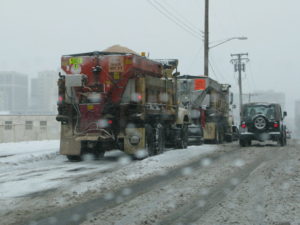 WMATA has announced that aboveground Metrorail service will shut down when snow accumulation reaches eight inches, as it did on Dec. 19. Don’t try to use Metrorail when the accumulation totals are nearing 8″ — there’s a real likelihood of the system shutting down as you’re in transit, stranding you halfway to your destination.
WMATA has announced that aboveground Metrorail service will shut down when snow accumulation reaches eight inches, as it did on Dec. 19. Don’t try to use Metrorail when the accumulation totals are nearing 8″ — there’s a real likelihood of the system shutting down as you’re in transit, stranding you halfway to your destination.
Some hardy souls may try to drive this weekend, despite pleas from local governments for drivers to stay off the road. If you absolutely, positively must drive, you’re likely to encounter a few salt trucks along the way. For many drivers, the exact rules of engagement around slow-moving salt trucks is unclear. Do you pass? How close to you get? To help shed some light, here are some salt truck safety tips, as emailed to arlnow.com from the county’s Department of Environmental Services:
Snow Operations Tips: Roadway Safety
- If you are behind a snow plow, stay at least 100 feet back to allow the truck adequate room to maneuver and see you in the rearview and side mirrors.
- Do not attempt to pass snow plows working in tandem on major roadways. Working together in a staggered pattern allows the plows to quickly clear more of the roadway.
- A snowplow needs a minimum roadway width of 15 feet to maneuver safely, and on many streets a snowplow cannot operate when cars are parked on both sides of the street.
- If you see a plow on a narrow, two-way road, consider an alternate route or wait for the plow to pass to ensure that both vehicles can safely navigate the road.
- Prior to a storm, work with neighbors to move as many cars off the street and into garages or driveways. Park all remaining vehicles on one side of the street – the ODD numbered side, if possible. With fewer parked cars, streets can be cleared more completely, safely and quickly. Your car is also less likely to be covered with salt and sand.
- Use extra caution when driving during, and shortly after, winter weather events. Roads can remain slippery for some time after trucks have plowed and treated them, especially when the temperatures remain low.

